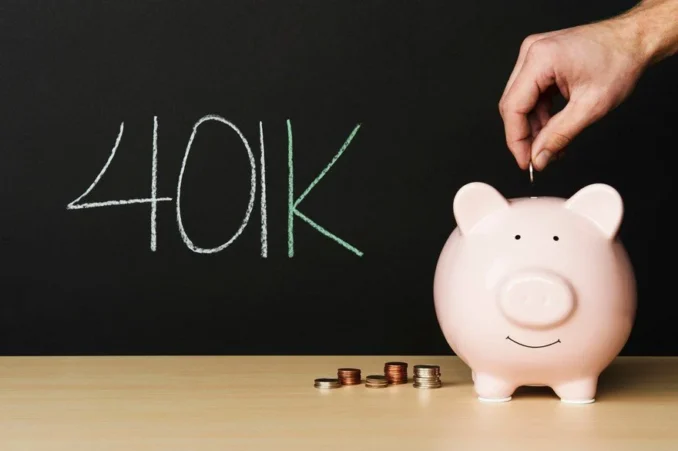During economic crises, many people reevaluate their finances and decisions regarding their savings, investments, and general spending behavior. Although this period is fleeting because it’s an integral part of economic cycles, many investors face it unprepared and make ill-considered decisions that can cost them a lot.
One of the most common questions people ask themselves is “how to protect my 401k from inflation and other negative recession effects.” Everyone wants to protect their retirement savings as best as possible, and several things can help you preserve your funds in times of crisis. Also, the recession is the time to avoid some common mistakes that can further worsen your financial situation during global economic hardship.
Stop Contributing to 401(k)

Source: fool.com
When the economy is booming, your income is enough to cover living expenses, current cash needs, and you still have enough money to put aside. Those who started thinking about the golden age in time do so mainly through traditional retirement plans like 401(k)s. The money in retirement accounts is quite safe, but many still doubt whether to continue contributing when the crisis strikes.
Those who worry that their retirement savings will disappear overnight or become worthless are considering pausing contributions or even completely withdrawing money from their 401(k)s. But while thinking that’s the right thing, they’re not even aware they’re doing themselves a disservice.
Putting your retirement savings on hold is the worst thing you can do during a recession. If you do this, you’ll miss compounding earnings. Also, you miss the chance for employer matching contribution, that is, an additional increase in your retirement fund that costs you nothing. Finally, once the market starts its recovery, you can’t count on potential gains.
Buy High-Yield Bonds

Source: swisslife-am.com
Investing is one of the best ways to preserve and increase your wealth, and experts always suggest that you spread your funds over several assets and thus mitigate a risk. However, there are times when these plans should be put on hold, and that is precisely when negative economic trends (inflation, interest rate growth, etc.) occur during a recession.
Certainly, this doesn’t mean you should not invest at all, but that you should think carefully about every decision. There are some assets that you should not consider during recessions. Among them are high-yield bonds and stocks of highly-leveraged companies. The first ones can be unsafe because they are mostly issued by small companies that maybe won’t make it through the recession.
Securities of highly-leveraged companies are mostly related to business entities already in trouble. Their prices are generally low, which, in an ideal world, would be an excellent business opportunity. If the company recovered after the crisis, you would yield pure profit. But that’s not a risk you should take, especially if your investment strategy is defensive.
If a company has trouble paying its debts, its shares can become even more worthless. Although it may only be a temporary drop, your low tolerance to risk can’t handle that loss. So it’s better to steer clear of such ventures during a crisis.
On the other hand, there are some investment vehicles that can save your portfolio during recession:
https://smartasset.com/investing/5-things-to-invest-in-when-a-recession-hits
Taking on New Debt

Source: scm.dk
A rule of thumb during economic crises is to keep an eye on your spending. Although you can’t avoid some costs even during a recession, you can certainly refrain from impulsive purchases and unnecessary expenses that can only lead you into new debt. That’s not something you need, especially if you already have a high DTI.
Loans are a very useful thing, but only when you use them for the right purposes and at the right moment. During good economic times, when your income is secure and the currency stable, borrowing money is a good way to afford something you’ve wanted for a long time, like a new car or a dream vacation. With responsible behavior towards this debt and regular payments, you won’t have any problems.
But when the situation is shaky, and you’re not satisfied with your job, salary, and general financial stability, assuming a new debt is the worst thing you can do. During a recession, the world faces many risks, and lenders protect themselves with higher interest rates on loans. At one point, this can lead to an excessive burden on your already tight budget and problems with repayment. That will undoubtedly have consequences, so the recession is time when you should definitely control spending.
Changing Jobs

Source: careeraddict.com
When a crisis shakes the global economy, it’s clear that many jobs are at risk. Many companies operate at a loss because they lose business opportunities due to the crisis, so they are forced to take certain measures, such as laying off workers, to overcome difficulties. That’s certainly more reason to be concerned, but a recession isn’t the time to think about career changes if your job is secure.
If you’re approaching retirement, you shouldn’t take the risk of changing jobs. It’s much better to accept things like a temporary reduction in pay or workload because you still have regular income and benefits like your 401(k). You might face some tough decisions due to income decline, so here are some handy tips on boosting your retirement savings.
On the other hand, if you’re younger and not so happy with your current position, it is wise to hold your horses for a while and stick to your current job. To make extra money during the recession, you can find a side gig or monetize some skills you already have. It’s also good to invest in your knowledge. Once the economy starts to show signs of recovery, you can strive for more career challenges.
Fear is often the driver of some ill-considered decisions. During a recession, you should refrain from that and be ready to make certain sacrifices that will help you overcome difficult times in the long term. Every crisis has an end, and it’s up to you to make wise moves to get through the financial difficulties as painlessly as possible.





